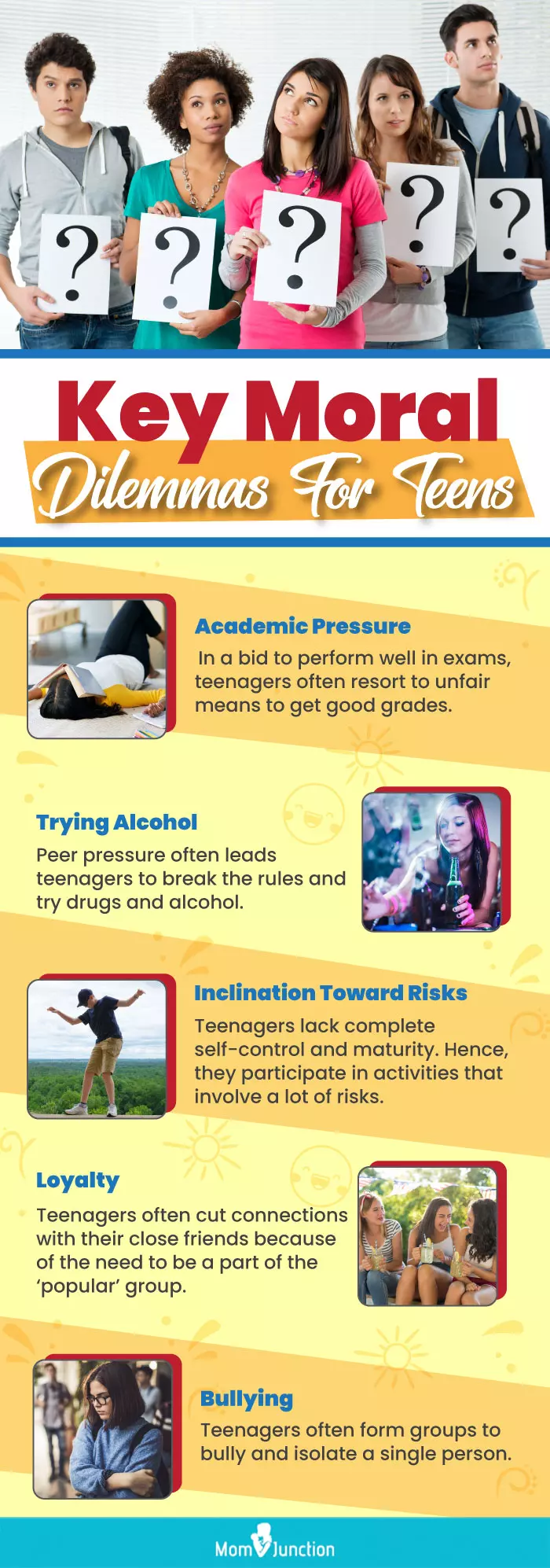
Image: Shutterstock
The range of dilemmas a teen seems to encounter daily is infinite, including the ethical dilemmas in teenagers. A few examples of it include whether or not to cheat in exams to take drugs and alcohol. In the case of a judgment or decision, an ethical dilemma occurs when one of the alternatives requires the individual to break or compromise on their ethical norms.
Helping your teen handle their dilemmas might be a difficult scenario for you. This post discusses some of the most typical ethical and moral challenges that teenagers confront and some simple solutions to help them overcome them.
Key Pointers
- Adolescents may face ethical dilemmas when making decisions that require a compromise on their values.
- Moral dilemmas can stem from academic pressure, peer influence, substance abuse, and unsafe environments.
- Poor self-control, lying, and poor decision-making can also contribute to ethical dilemmas.
- Parents can prepare their children by offering moral guidance and teaching decision-making skills.
- Teaching conceptual distinction, analyzing situations and consequences, and showing appreciation and guidance are helpful strategies.
Common Ethical Dilemmas For Teenagers
Teenagers often face ethical dilemmas that challenge their understanding of right and wrong, legality, and social norms. Here are some common ethical dilemmas that can make your teen’s life miserable:
1. Academics

Image: IStock
- Your teen may face moral quandaries when they have to perform well in academics.
- Your teen may succumb to peer pressure, or be starstruck by the college’s name. And, they may try to cheat in their examinations or peek at other student’s answer sheet to get desirable grades.
 Research finds
Research finds2. Drugs And Alcohol
- Teenagers have an inclination towards trying drugs and alcohol.
- Your teen may be tempted to try drinking or smoking after observing the close friends.
- They feel that the consumption of alcohol and drugs makes them cool, and remain popular among friends.
- Parents and teachers always discourage teens from drug addiction, as an overdose can lead to nasty complications.
3. Lying

Image: IStock
- Your teen may lie because they never want to disappoint or hurt you or any of their closest friends.
- Teens often lie to cover their faults like not attending school, addiction to drugs or to hide pornographic material.
- Your teen lies to you when they fear you might overreact or scold them about their academics.
 Did You Know?
Did You Know?4. Snitching
- Your teen often tends to snitch and practice tattle-tailing, as they may not want to betray or upset their parents or dear ones.
- Sometimes your teen may follow this ethical dilemma to stay loyal to her loved ones and ensure her personal safety.
5. Risk-Taking Behavior
- During teenage, the social environment is quite unstable, and your teen is under immense peer pressure.
- It can lead to irresponsible and inappropriate teenage behavior.
- You may think that your teen may follow social ethics before getting involved in any risky decision. But you should know that the teenage brain has less self-control and possesses poor decision-making ability to make an ethical judgment.
- As a responsible parent, you need to teach your teen social ethics so they can take up ethical responsibilities that will make them understand the value of life.
- You can encourage your teen to go through question-and-answer sessions, to check her decision-making ability. (1)
Tips To Handle Ethical & Moral Dilemmas For Teenagers

Image: IStock
You can use the following tips to handle your teen’s dilemma:
- Before handling any teenage dilemmas, it is necessary to analyze the entire situation holistically, consider all perspectives, weigh the consequences, and choose ethical solutions.
- Parents and teachers play a pivotal role in solving dilemmas for teens and they should prepare them to handle the scenario positively. By offering the appropriate ethical guidance and support, they can also serve as primary sources of ethical resources and ethical role models for their children.
- Try to guide your teen subtly and teach them what they should do, and what they should avoid. Make your teen understand the conceptual differences between ethics and morals in life.
- Your teen needs to make an accurate moral judgment and have a clear idea of the ethical consequences.
- Help your teen analyze the situations aptly to comprehend and solve their ethical concerns and dilemmas.
- Always appreciate your teen’s hard work and don’t be judgmental. For instance, if your teen studies hard for exams try to appreciate her, but never tempt her with rewards.
- Proper parental guidance in parenting teenagers can prepare your teen to face several moral dilemmas, cope with stress easily, and not lose her mental peace. For instance, you may share cases and examples from your life that the child can find relatable. It can inspire your child to make the right and ethical choices.
 Point to consider
Point to considerFrequently Asked Questions
1. How can teachers help foster ethical decision-making in teenagers?
Teachers can include teaching ethical reasoning in the classroom by using real-life situations as examples. This can model ethical behavior in children, and teachers may further encourage this behavior through motivation, ethical counseling, and ethical mentoring.
2. How can teenagers demonstrate respect for the rights of others when considering ethical conflicts or dilemmas?
A teenager can show courtesy to the rights of others by incorporating empathy, honesty, active listening, transparency, and fairness in their decision-making process. Encourage the teenager to prioritize the well-being of everyone in a situation before arriving at a decision or conclusion.
Teenage is a time when children go through many physical and psychological changes. These changes may bring along emotional turmoils and ethical problems. Parents often find their teenagers struggling with ethical predicaments and dilemmas. Ethical dilemmas for teenagers arise when they struggle to find the best choice for themselves. Your teenagers would often battle with moral and ethical issues such as good academic performance, where they may be tempted to cheat during examinations to get good grades. Sometimes, they may be concerned with the implications of alcohol and drug consumption. Dilemmas like these and many others can be sorted with the support of parents and teachers. So, always talk to your teenager and try to understand their perspective. Also, guide them by offering the right advice.
Infographic: Moral Dilemmas Faced By Teenagers
Teenagers experience various moral and ethical dilemmas. In addition, there are various challenging decisions that teens need to make every day. Scroll through the infographic below to learn about the major issues your teen needs help navigating. Save and share it with parents of other teens too! Illustration: Momjunction Design Team
Illustration: Tips To Handle Ethical & Moral Dilemmas For Teenagers

Image: Stable Diffusion/MomJunction Design Team
An ethical dilemma is a difficult situation where you must choose between two options, both of which have moral implications. Explore this video to unravel the complexities of such situations.
References
- Moral Dilemmas.
https://plato.stanford.edu/entries/moral-dilemmas/ - The Most Important Statistics About Teen Stress.
https://www.stress.org/more-stress-information/ - Liar, liar, pants on fire: The truth about children’s lies – MSU Extension
https://www.canr.msu.edu/news/liar_liar_pants_on_fire_the_truth_about_childrens_lies
Community Experiences
Join the conversation and become a part of our nurturing community! Share your stories, experiences, and insights to connect with fellow parents.
Read full bio of Shreshtha Dhar
Read full bio of Manjiri Kochrekar
Read full bio of Harshita Makvana
Read full bio of Apoorva K

























